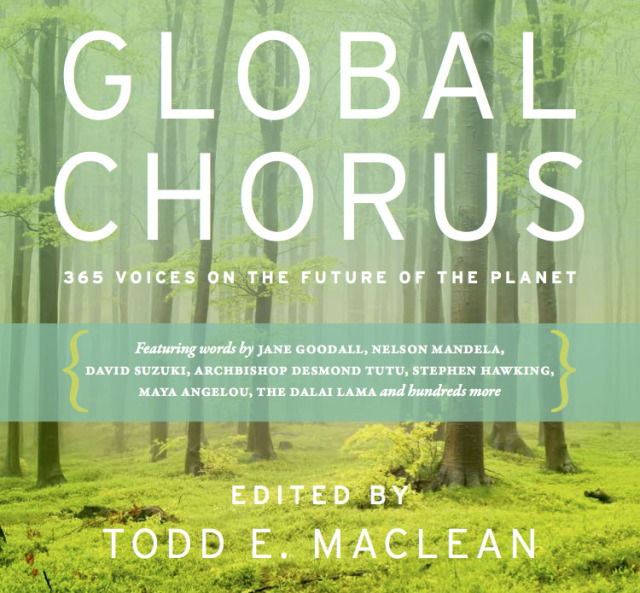
What do Nelson Mandela, the Dalai Lama and Green Diva Lynn Hasselberger have in common?
They’re all featured in Global Chorus, a beautiful book filled with wise words from 365 leaders (and “regular” environmental advocates) around the globe who are making the world a better place. We spoke with Todd MacLean, editor-in-chief of this project. Read on for a few book excerpts.
But first, listen to our conversation with Todd on latest Green Divas Radio Show, which also includes special Green Divas myEARTH360 Report with EcoWatch founder Stefanie Spear plus a Green Divas Foodie-Phile on GD Meg’s delicious better butter coffee . . .
Enjoy these excerpts from Global Chorus: 365 Voices on the Future of the Planet. Published here with permission.
The environmental and social crises are complex and at times our circumstances can feel impossible to turn around.
There’s discourse about how to resolve our problems and even heated controversy over what crises are real. Pile on our political, economic and religious differences, sprinkled with language barriers, and you’ve got chaos.
How do we get past this? It will take Herculean strength, but the answer is simple. We need to toss aside our differences and concede that we’re all hu- man. Each and every one of us needs clean water, clean air, safe food and shelter; and these basic needs are human rights regardless of race, social status or religious belief. That has to be our foundation for moving forward.
Now we have to take that a step further – while the world is comprised of different countries, one country’s actions impacts all others in some way. We need to be accountable to one another because we’re all connected and, ultimately, share the same air and water. Nothing should stop the global community from collaborating and agreeing upon incentives for corporations and entire countries that develop technologies and practices that protect our environment (i.e., clean energy, sustainable farming, educational tools for developing countries, water retention and purification). There should also be globally enforceable consequences for corporations and countries that harm the environment in any way. Why can’t we integrate this into our international human rights law?
It has to start with individuals. You and me. Thanks to the Internet, we have an instant global community. We can initiate these conversations and influence others one by one to join this redefined humanitarian movement. Our survival and that of all species left on this Earth depends on it. If we put humanity first, there is hope.
~ Lynn Hasselberger
concerned mom, environmental advocate, Green Diva
founder, myEARTH360
There aren’t “ten easy ways” to solve the eco-crisis.
When asked what the chances are that humanity will survive to the end of this century, Sir Martin Rees, Royal Astronomer in the UK replied, “Fifty fifty!” James Lovelock, who named the web of life on Earth “Gaia,” predicts billions of people will die in this century, reducing global population to 10 percent, while Australian eco-philosopher Clive Hamilton’s book Requiem for a Species is about our demise.
The eco-crisis of the 21st century is not going to be solved by “ten easy ways” or even a hundred. Despite decades of warnings by top scientists that we are heading along a very destructive path, countries around the world continue the drive for endless economic growth that is undermining the life support systems of the planet.
All I have left is hope, hope that is based on the fact that we don’t know enough even to say it is too late to turn things around, but it is very, very late.
~ David Suzuki
scientist, broadcaster, environmental activist
Can we save Planet Earth? Of course we CAN.
The question is, will we? We have indeed disturbed the balance of Nature everywhere, as environments are destroyed by the desperation of millions living in crippling poverty and the selfish unsustainable lifestyles of the rest of us.
No wonder young people are losing hope. “We have not inherited this planet from our parents, we have borrowed it from our children” is an oft repeated saying. That is a lie – we have not borrowed but stolen. We are told that unlimited economic development is possible. Another lie, for the planet has only finite natural resources.
Fortunately there is a groundswell of those who realize that Mother Nature cannot continue to supply our needs at the current rate and that the time will come when it is too late to heal the scars we have inflicted. That time is close, but there is hope. Already we are coming up with new technologies to enable us to live in greater harmony with Nature.
More and more of us are thinking about the consequences of the choices we make each day so as to leave the lightest ecological footprint. Every individual matters, has a role to play and makes a difference – every day. And Mother Nature is amazingly resilient – polluted rivers, devastated landscapes, species on the verge of extinction – can be restored, given another chance.
Above all, I am inspired by today’s youth. Once young people are aware of the problems around them and empowered to take action, their energy, determination and commitment are boundless. They are changing the world one problem at a time, encouraging each other, influencing their parents and grandparents. They will be the next doctors, lawyers, politicians and parents, and they know that while we need money to live, we should not live for money. The human spirit is indomitable. We shall not give up.
Jane Goodall, PhD, DBE
UN Messenger of Peace, founder of the Jane Goodall Institute
For more information, visit GlobalChorus.ca.
Stay tuned for how you can get your hands on a copy of “Global Chorus” signed by Todd and GD Lynn!
[dynamic-sidebar id=’Custom Widget 2′]
Pingback: Earth Day Connection Listen to the Earth | Care2 Healthy Living